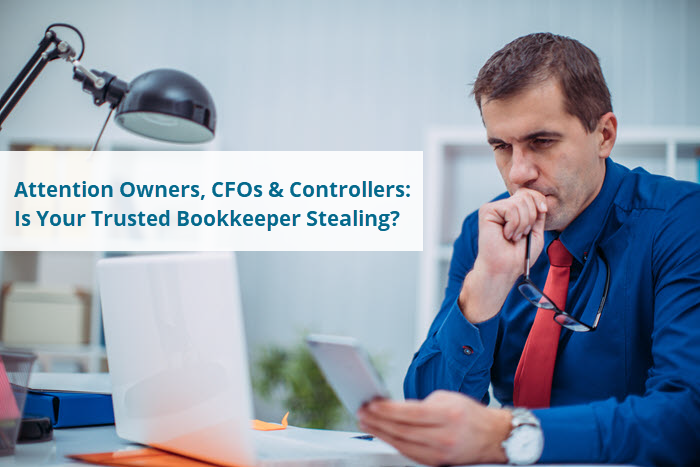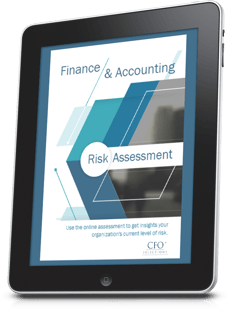
There are professions that most people would consider trustworthy. Doctors & nurses, firefighters, and teachers all come to mind. How about accountants? Do you trust your bookkeeper? The reasonable answer here is: Yes! Trust is often built over time, through relationships and evidenced by past and ongoing performance. The reality is, if you didn’t trust your employees, they probably wouldn’t still be working for you.
Accounting work is likely one of those aspects of business ownership that most would prefer is done by someone else – and hence the bookkeeper. The combination of trust and lack of interest in the accounting tasks causes many owners to simply hand over the accounting files and checking account and walk away.
Although this may sound appealing, employee theft is rampant. According to the 2012 Association of Fraud Examiners Report to the Nation (ACFE), the typical company loses 5% of its revenues to fraud every year. Even worse, the average loss for construction companies is $300,000 – the third highest of all industries!
A significant portion of this fraud can be attributable to 2 primary ways owner trust has been misplaced.
Misplaced Trust in your Bookkeeper and other Employees
On far too many occasions, owners think fraud could never happen in their company because they have honest, ethical employees. Employees become personal friends and over time even become like family. However, while your bookkeeper may be honest, given the wrong circumstances people’s ethics can get pushed aside.
Consider what would happen if your bookkeeper had a sudden family medical issue that created intense financial pressure. Would you notice personal expenses on a company credit card? How about a fake employee in the payroll system? In an atmosphere with little oversight, your bookkeeper may very well decide to ‘borrow’ from your easy-to-access company bank account. If gone undetected, the fraud could grow out of control, putting your business in jeopardy.
5 Action Items:
- Set the Tone. Set a standard of honesty, integrity, and fairness in the company. Communicate with your employees that unethical actions are not acceptable and follow through with discipline if necessary. A policy alone is not enough. As the saying goes, actions speak louder than words.
- Allow upstream Communication. Encouraging communication may prevent an employee from attempting theft. Hold one-on-one meetings, have an open-door policy, create a suggestion box for comments.
- Watch for Warning Signs. In real life, the person you hired 3 or 10 years ago is the not the same person today. People change, and so do their circumstances. According to the ACFE, in 81% of fraud cases, there were warning signs that the fraudster’s life was not going well. Staying in tune with these signs could prevent a disaster:
- Living beyond their means
- Financial difficulties
- Unusually close relationship with a customer or vendor
- Unwillingness to share duties
- Family problems
- Perform reference checks. I’m amazed how many times this step is skipped during the hiring process. A 10-minute phone call with a former employer or even a candidate’s friend can be revealing. Ask hard questions, let the reference keep sharing, and eventually, you’ll start receiving honest opinions and feedback.
- Remain diligent. Remember that while you trust your employees, they still need oversight to maintain accountability. Don’t be fooled into thinking employee theft could never happen to you. No one ever sees it coming!
Misplaced Trust in your Check Signature
Can you comfortably answer this question?
“What would prevent my bookkeeper from entering an invoice in the accounting system, printing a check made payable to ’Cash’, and forging your signature?” Or rather, “if this happened, how would you catch it?”
The unfortunate fact is most owners would be unable to prevent or detect this type of fraud. There is a significant misunderstanding that if you sign the checks, and review every invoice, you are protecting your company from fraud. This is absolutely NOT TRUE!
Additionally, many accounting professionals will also advise you to require two signatures. This step will add another set of eyes to valid transactions but does not protect you from the fraudulent ones.
5 Action Items:
- Don’t allow your bookkeeper to access the blank check stock. If you use a laser printer, restrict access to the printer. All blank checks should be secured and tracked by someone without accounting access.
- After checks are signed, they may not be returned to the bookkeeper. Mail them immediately or have someone without accounting access mail the checks.
- Obtain the canceled checks from the bank and review for evidence of tamperings, such as a phony payee or revised amount.
- Physically open the bank statement, and review any unauthorized electronic payments, such as an extra ACH transfer to an unknown vendor.
- Implement Positive Pay. This is a service whereby the company submits check information to the bank (payee, amount, check number, etc.). When the payee deposits the check, the bank attempts to match the submitted check to the company information. If a match is found, the check will be processed. If a matched check is not found, the company is notified and has an opportunity to pay or return the check.
The risk of employee theft occurring in your accounting department is significant and, in many cases, it goes beyond the basics of signing checks. While we all like to think the better of people, especially long-term employees, owners need to be aware of life changes and how those changes could impact the risk that theft could happen in your business.
If you found this helpful, sign up to get the next update and get CFO’s Perspective sent directly to you.
 A financial risk assessment can make all the difference for your business. Preparing to take advantage of opportunities and eliminate potential landmines makes good business sense.
A financial risk assessment can make all the difference for your business. Preparing to take advantage of opportunities and eliminate potential landmines makes good business sense.
Get instant access to our free finance and accounting risk assessment!
Contact CFO Selections® now with any questions about our services.
About the Author
 Todd Kimball is a senior accounting professional with over 15 years of expertise in the nonprofit and government sectors. He has a proven track record at tackling the most challenging nonprofit accounting issues and finding solutions that work and move organizations forward. He excels at creating process efficiencies, motivating and utilizing staff to their full potential, implementing internal controls, and providing sound technical expertise. Todd focuses on the big picture but doesn’t hesitate to dive into the details. More about Todd here: www.cfoselections.com/consulting/team/todd-kimball
Todd Kimball is a senior accounting professional with over 15 years of expertise in the nonprofit and government sectors. He has a proven track record at tackling the most challenging nonprofit accounting issues and finding solutions that work and move organizations forward. He excels at creating process efficiencies, motivating and utilizing staff to their full potential, implementing internal controls, and providing sound technical expertise. Todd focuses on the big picture but doesn’t hesitate to dive into the details. More about Todd here: www.cfoselections.com/consulting/team/todd-kimball





